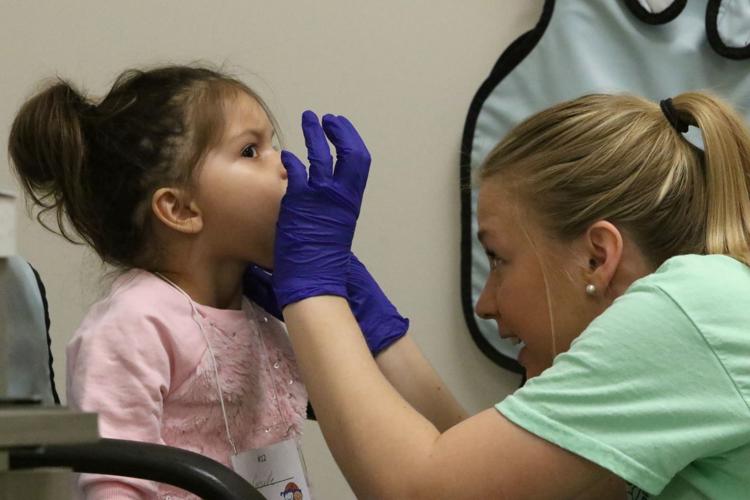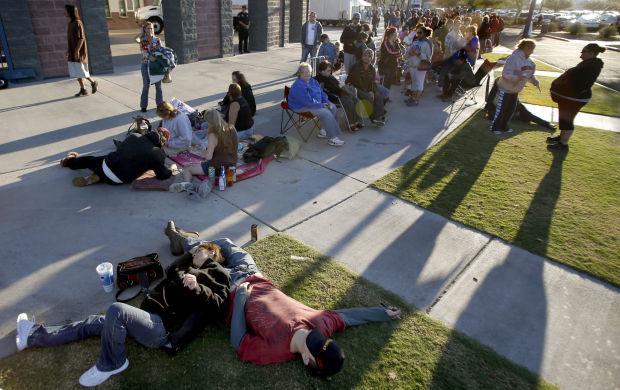PHOENIX — The issue remains divisive, but dental therapists are closer to becoming a new, licensed profession in Arizona.
Over the objection of dentists, Arizona’s Senate health committee voted 4-3 Wednesday to move forward a bill that would establish dental therapists as “mid-level” providers, who would play a role similar to that of nurse practitioners and physician assistants in the medical world.
The debate pitted dentists from the Arizona Dental Association against a coalition that includes tribes, the conservative Goldwater Institute and the Arizona Rural Health Association, among others.
Neither side disputes the fact that Arizona’s oral health needs are immense. One need only look at lineups for charity dental events in Tucson and Phoenix. However, each side of the dental therapy debate disagrees on how to solve the problem.
Supporters of allowing dental therapists say they could help provide a limited scope of dental procedures such as fillings, extractions and crowns at a lower cost.
A dental therapist would require less education than a dentist. Tribal leaders are interested in creating routes to enter the profession via community colleges, including Tohono O’odham Community College on the Tohono O’odham Reservation southwest of Tucson.
But critics cited patient safety as a concern.
Sen. Kimberly Yee, R-Phoenix, said she could not support a measure that seeks to address acute oral health needs with people getting less training than dentists.
Arizona Dental Association executive director Kevin Earle characterized adding dental therapists to solve oral health problems as “a race to the bottom.”
“To take a provider who is ill-trained and dump them into a dysfunctional system to me defies logic,” Earle said.
Earle said the problem is not a lack of dentists, but a lack of access to them that could be alleviated with better dental policy and with help from the state’s Medicaid program, which is called the Arizona Health Cost Care Containment System or AHCCCS.
AHCCCS is a government program for low-income people, and not enough dentists are credentialed to accept AHCCCS payments, Earle said.
He said another problem is policy. While nearly 2 million Arizonans are covered by AHCCCS, adults in the program only recently have been able to receive dental care, and preventive care isn’t covered. They can receive $1,000 per year for emergency dental services.
Earle’s organization supports proposed legislation that would add another $1,000 per year for pregnant AHCCCS enrollees — an amount that could be used for preventive care.
The economic factors that keep dentists from practicing in rural areas will also exist for dental therapists, the dentists said.
“Why would we be so against dental therapists?” Scottsdale endodontist Dr. Robert Roda said. “It doesn’t work.”
Roda said he’s concerned that three years of dental therapy training would not be adequate to qualify therapists to perform surgical procedures.
Yet even if dental therapy doesn’t pass this legislative session, the issue is not likely to go away, said Sen. David Bradley, D-Tucson, before voting “yes.”
“The practice of medicine is changing rapidly,” he said.
Bradley has led a legislative oral health task force. When the issue of dental therapists first came before a legislative subcommittee in December 2016, he voted “no.” He still doesn’t like the name “dental therapist” and thinks there could be a better description of the job.
But he thinks the dentists and the Dental Care for Arizona coalition need to talk to one another and get a “clearer idea of where we are going.”
Senate health committee chair Nancy Barto, R-Phoenix, has long supported including dental therapists as a profession in Arizona, as they already are in Minnesota and on tribal lands in Alaska. Maine and Vermont are moving forward with plans to add dental therapists and other states have pending dental therapy legislation.
Barto calls the creation of dental therapists a “free market solution,” and said she sees no reason to stand in the way of Arizonans who need affordable dental care.
Among those who spoke in favor of dental therapists at Wednesday’s hearing was Dr. Dan Derksen, a family physician, health policy expert and professor of public health at the University of Arizona.
Derksen said oral health problems in Arizona are disproportionately affecting rural areas, tribes, Latino populations and the elderly. Charity dental events are not the best way to meet those needs, Derksen said.
People without dental care are vulnerable to heart and kidney disease, diabetes, high blood pressure and even premature death.
“In many parameters for oral health we’re already close to 50 out of 50,” ranking near to worst among the states, he said. “This race to the bottom? We’re already there.”





